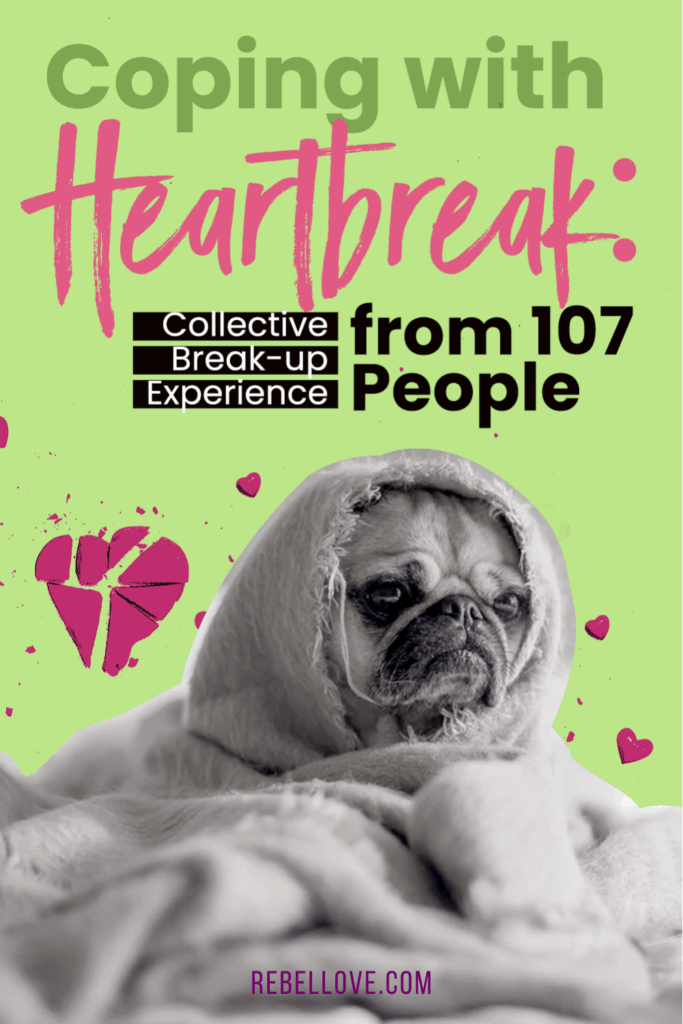This post may contain affiliate links and I may be compensated for purchases visitors make through these links. I only promote products and services I really care about and that I think are useful. Read the full policy here.
If you’re sitting in a dark room right now, crying into a big bowl of ice-cream while you stalk your ex and their new lover on Instagram, you’re not alone. Break-ups are hard; the problem is, when it happens to you, it can feel like you are the only one dealing with heartbreak.
At Rebel Love, we wanted to try and understand a bit more about break-ups — how they happen and how we cope. So, we surveyed over 107 people on break-ups: men and women, aged 15 to 51+, from 6 different continents. Some had been together for less than a year, others for a decade.
This is what we discovered:
Other reasons: they were secretive/stopped sharing, no more dates, our sex life changed, they were defensive, anything caused an argument, “I love you” was stopped being said, more time with friends/family was allocated than the time spent with me, became extremely distant.
Love hurts
When asked how painful the experience of their break-up was, on a scale of 1-10, an overwhelming 85% of people gave an 8+, with over half the participants giving the experience a full 10 on the pain scale. It appears, no matter what the reason for the break-up, it’s almost always excruciating.
I don’t want to see your reaction when I break up with you
The ‘Dear John’ letter of yesteryear is still rampant in the digital age; it’s just moved with the times. According to our survey, the most popular method of breaking up was text message, followed by over-the-phone. In fact, just under half of those surveyed broke up without seeing their partner’s face. Ouch!
We all need someone to lean on, including ourselves
We all deal with the heartache differently. Of those surveyed, 30% found a new hobby to distract them, while almost half found listening to music therapeutic; (sometimes a sad playlist about broken hearts is all you need).
However, the most popular coping device used by far was leaning on friends and family for support. This was followed closely by consciously taking care of the mind, body, and soul. So, it seems that self-love and love from those closest to you are some of the best ways to get through tough times.
Lies are tearing us apart
I’m not upset that you lied to me, I’m upset that from now on I can’t believe you.
– Friedrich Nietzsche
Infidelity: it seems to be the ageless excuse for break-ups. It was no different with our survey group, with half saying it was the number one reason for their break-up. Another 25% said lying was the reason they were no longer with their partner. So, for healthy relationships, it seems honesty really is the best policy.
Other reasons: addiction, distance, commitment issues, health issues, bad communication, fell out of love, family/friends, loss of trust, incompatibility, finances, work-related, no physical attraction, abuse, indecision, timing, etc
I want you out of my life, (mainly)
It looks like the old break-up line, “let’s be friends,” is old news (or it wasn’t plausible to begin with). Although half of those surveyed have had contact with their ex since the break-up, 71% said they are no longer friends. However, 15% admitted to intimate contact after the break-up, so some are still getting along just fine!

Although our survey group was from all parts of the world, their responses showed us breakups are challenging no matter where you are from. So, the question you may ask, is how to best deal with it? This 2017 study suggests it is better to confront the initial pain and spend time evaluating yourself and the breakup (in a supportive environment), rather than avoidance. It concludes that the more you know of the reasons for the break-up, the less chance you will have of relationship conflict in the future. So maybe it’s time to stop the Instagram-stalking and look to self-reflection, for a brighter tomorrow.